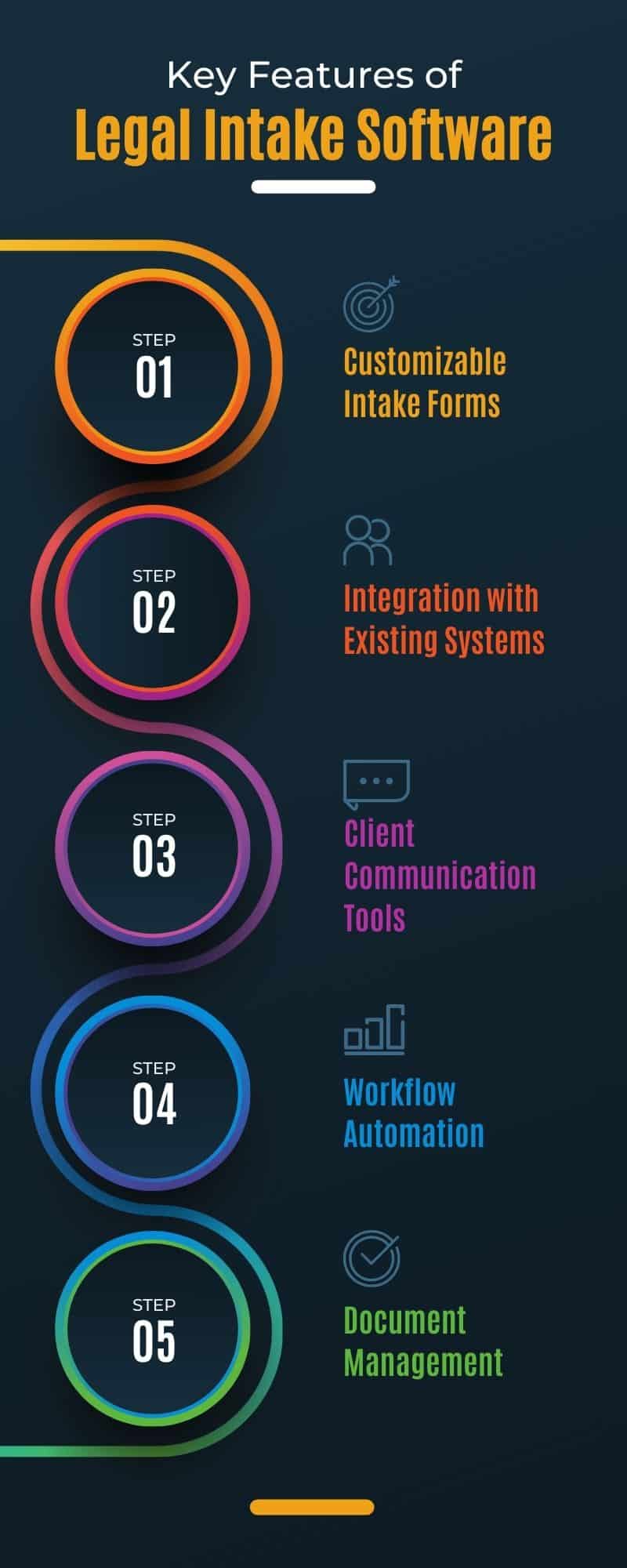Legal Intake Software
Role of Legal Intake Software in Modern Legal Practices
What is Legal Intake Software?
Importance of Effective Client Intake in Legal Firms

Evolution From Manual Processes to Digital Solutions
Benefits of Legal Intake Software
1. Efficiency and Time-Saving
- Reduction in Paperwork and Manual Data Entry: Legal intake software eliminates the need for extensive paperwork and manual data entry, which are time-consuming and prone to errors. With digital forms and automated data capture, you can efficiently collect and process client information–streamlining the intake process and allowing you to focus on higher-value tasks.
- Automated Appointment Scheduling: Many legal intake software solutions have appointment scheduling features. This automation simplifies the process of setting up consultations and meetings, reducing the back-and-forth communication between you and your clients. It ensures that appointments are scheduled promptly and conveniently for both parties, enhancing the overall client experience.
2. Improved Accuracy and Compliance
- Error Reduction in Data Collection: Manual data collection can lead to errors, omissions, and inconsistencies in client information, which can have serious consequences in legal proceedings. Legal intake software minimizes these risks by enforcing data validation and accuracy checks. You are guided through structured intake forms, reducing the likelihood of mistakes and incomplete information, ensuring the integrity of your client data.
- Ensuring Compliance With Legal Regulations: Legal firms are subject to various regulations and confidentiality requirements, such as HIPAA in healthcare or GDPR in data privacy. Legal intake software can be configured to ensure that your client data is collected and stored in compliance with these regulations. This helps you avoid legal and ethical pitfalls while maintaining the trust of your clients.
3. Enhanced Client Experience
- Seamless Online Intake Forms: Legal intake software enhances the client experience by providing seamless online intake forms. Clients can easily access and complete these forms from the comfort of their homes or workplaces, eliminating the need for time-consuming in-person visits or postal mail. The user-friendly interface of these digital forms ensures that clients can provide necessary information conveniently, improving accessibility and convenience.
- Faster Response Times and Communication: Legal intake software streamlines communication between you and your clients. Automated notifications and alerts keep you informed about the progress of your cases, appointments, and important deadlines. You can respond to client inquiries promptly, resulting in faster response times and better customer service. This increased responsiveness builds trust and confidence, strengthening your overall client-lawyer relationship.
4. Data Analytics and Reporting
- Generating Insights From Intake Data: Legal intake software allows you to gather a wealth of data from client interactions. This data can be analyzed to gain valuable insights into client demographics, case types, and trends. By identifying patterns and trends, you can tailor your services to meet specific client needs more effectively. For example, you can identify which practice areas are in high demand or which marketing channels are most successful in attracting clients. This data-driven approach can help you make informed decisions and optimize your legal services.
- Improving Decision-Making: Informed decision-making is crucial for the success of your law firm. Legal intake software provides the tools to generate comprehensive reports and analytics, enabling you to make data-driven decisions. Whether allocating resources, setting pricing strategies, or adjusting marketing efforts, having access to intake data analytics empowers your law firm to make informed choices that lead to better outcomes.
Legal intake software not only enhances the client experience by simplifying the intake process but also empowers your law firm with valuable data-driven insights.
Key Features of Legal Intake Software
1. Customizable Intake Forms
- Tailoring Forms to Specific Practice Areas: Legal intake software allows your law firm to create and customize intake forms tailored to your specific practice areas. Whether your firm specializes in family law, real estate, personal injury, or corporate law, these forms can be adapted to collect the most relevant information for each type of case. This customization ensures that clients provide the necessary details for their specific legal matters, resulting in more accurate case evaluations and better-informed decisions.
- Collecting Relevant Information Efficiently: With legal intake software, your law firm can efficiently gather essential client information using structured, user-friendly forms. These forms are designed to guide your clients through the intake process, reducing the chances of incomplete or inaccurate data. By collecting all relevant details at the outset, your legal professionals can save time, minimize errors, and ensure a smoother transition into case management. This enhances your overall operational efficiency and client service quality.

2. Integration with Existing Systems
- Compatibility With Case Management Software: Many law firms like yours use case management software to organize and track cases. Legal intake software is designed to integrate seamlessly with these existing systems. This compatibility ensures that client information collected during intake is readily transferred to the case management system, eliminating the need for manual data entry and reducing the risk of data errors. This integration streamlines your workflows, allowing legal professionals to focus on providing legal counsel rather than administrative tasks, ultimately increasing efficiency and productivity.
- Seamless Data Transfer and Synchronization: Integration between legal intake software and case management systems ensures data is transferred and synchronized in real time. This means that any updates or changes made in the intake software are instantly reflected in the case management system and vice versa.
This synchronization ensures all team members can access the most up-to-date client information, fostering collaboration and improving overall case management efficiency.
These key features of legal intake software enhance your law firm’s efficiency and contribute to more accurate and tailored client interactions, ultimately benefiting both your team and your clients.
3. Client Communication Tools
- Automated Emails and Notifications: Legal intake software includes communication features that automate client notifications and updates. You can ensure that your clients receive automated emails and notifications regarding the status of their cases, upcoming appointments, and important deadlines. This not only keeps your clients informed but also reduces the administrative burden on your law firm, ensuring that critical information is conveyed in a timely and consistent manner. This feature enhances the overall client experience and streamlines your internal processes.
- Secure Client Portals for Document Sharing: Many legal intake software solutions offer secure client portals for document sharing. These portals allow you to securely upload necessary documents, such as contracts, invoices, or evidence. Legal professionals can then access and review these documents securely and organized. This feature simplifies the document exchange process, enhances data security, and improves collaboration between you and your clients, making the process more efficient and secure.
4. Workflow Automation
- Streamlining Intake Process: Legal intake software simplifies the intake process by automating various steps. It provides predefined workflows that guide your legal professionals through the necessary intake procedures, ensuring consistency and compliance. This automation reduces the risk of oversight and allows your firm to standardize your intake processes, regardless of the complexity of the case or practice area. It brings efficiency and organization to your intake process, helping your firm operate more smoothly.
- Task Assignment and Tracking: Workflow automation within legal intake software includes task assignment and tracking features. It assigns specific tasks to individuals or teams, tracks task progress, and provides alerts for overdue or pending assignments. This ensures that everyone in your firm knows their responsibilities and deadlines, improving overall efficiency and accountability. With these features, you can streamline task management and ensure that all necessary steps are taken promptly, enhancing the effectiveness of your legal intake process.
5. Document Management
- Storing and Organizing Intake Documents: Legal intake software includes robust document management capabilities. It allows your firm to store, categorize, and organize intake documents in a centralized digital repository. This eliminates the need for physical storage space, minimizes the risk of document loss, and enhances document security.
- Easy Retrieval and Sharing of Important Files: With legal intake software, essential documents are readily accessible. You can quickly retrieve necessary documents for case evaluation, preparation, or client communication. Additionally, these documents can be securely shared with clients or other stakeholders when needed, ensuring that information is readily available and shared in a controlled manner.
These features contribute to improved client interactions, streamlined internal processes, and enhanced data security, making legal intake software an invaluable tool for your law firm’s efficiency and client service.
Choosing the Right Legal Intake Software
1. Factors to Consider
Selecting the right legal intake software for your law firm is a critical decision that can significantly impact your operations and client interactions. To make a well-informed decision, take into account the following essential factors:
- Practice Area Specialization: Different practice areas require different intake forms and processes. Ensure the legal intake software you choose can be customized to match the specific needs of your practice area. For example, if you specialize in personal injury law, the software should support intake forms tailored to accidents, medical records, and other relevant information.
- Scalability and Pricing: You should evaluate the software’s scalability to ensure it can grow with your firm’s needs. Consider the pricing model, whether it is based on the number of users, cases, or features. Determine how well the software aligns with your budget and long-term expansion plans.
- Integration Capabilities: Seamless integration with your existing systems, such as case management software and email clients, is crucial. Look for legal intake software that can easily synchronize data with your other tools to avoid duplication of effort and data entry errors.
- User-Friendliness: The software’s usability is essential, as it directly impacts your staff’s productivity and the client experience. Choose software with an intuitive interface that simplifies the intake process for clients and legal professionals. Training requirements for your team should also be considered to minimize disruptions during implementation.
By carefully assessing these factors and conducting thorough research, you can ensure that the legal intake software you select aligns with your law firm’s goals and effectively enhances your client intake processes.
2. Tips for Evaluating and Selecting the Best Solution
Selecting the best legal intake software for your law firm requires a thoughtful and systematic approach. Here are some valuable tips to guide your evaluation and decision-making process:
- Research and Compare Different Options: Conduct thorough research into the available legal intake software solutions. Identify several potential options that meet your initial criteria regarding practice area specialization, scalability, integration capabilities, and user-friendliness.
Create a comprehensive list of essential features and functionalities for your law firm’s intake process. This will serve as a benchmark for comparing different software solutions. - Request Demos and Free Trials: Many legal intake software providers offer live demonstrations and free trials of their products. Take advantage of these opportunities to gain practical experience with the software.
During demos and trials, consider how well the software aligns with your firm’s specific needs. Test its customization capabilities, user interface, and ease of use. Engage your team in the evaluation process to gather multiple perspectives. - Seek Client Testimonials and Reviews: Explore client testimonials and reviews from other law firms that have adopted the software you’re considering. Look for feedback on how the software has impacted their efficiency, accuracy, and client satisfaction.
Contact colleagues in the legal industry or professional networks to inquire about their experiences with legal intake software. Their insights and recommendations can be invaluable in your decision-making process. - Consider Support and Training: Assess the quality of customer support and training the software provider provides. Adequate training and ongoing support are essential for a smooth implementation and efficient use of the software within your firm.
Inquire about the availability of resources such as user guides, video tutorials, and a dedicated support team to address any issues or questions.
By following these tips and thoroughly evaluating your options, you can make an informed decision when selecting legal intake software for your law firm. Choosing the right solution can improve operational efficiency, enhanced client experiences, and a competitive advantage in the legal industry.
Implementation and Training
Best Practices for Implementing Legal Intake Software in a Law Firm
- Define Clear Objectives: Set specific software implementation goals and objectives. Understand what you aim to achieve–whether it’s improving efficiency, increasing accuracy, or enhancing client satisfaction.
- Involve Key Stakeholders: Engage key stakeholders within your firm, including attorneys, paralegals, administrative staff, and IT professionals in the decision-making and implementation process. Their input and buy-in are crucial for success.
- Customize the Software: Tailor the legal intake software to align with your firm’s unique needs and practice areas. Customize intake forms, workflows, and notification settings to optimize the intake process.
- Data Migration: If transitioning from existing systems, ensure a smooth data migration. Accurate data transfer is essential to avoid disruptions and maintain historical client information.
Importance of Staff Training and Support During the Transition
- Comprehensive Training: Provide thorough training to all staff members using the software. Offer training sessions, workshops, or access to user manuals to ensure they can effectively use the software.
- Ongoing Support: Establish a support system to address any questions, issues, or challenges that may arise during and after the transition. A dedicated support team or point of contact can alleviate concerns and promote successful adoption.
- User Feedback: Encourage staff feedback on their experiences with the software. Act on their suggestions and concerns to continuously improve the software’s usability and functionality.

Ensuring a Smooth Integration With Existing Workflows
- Workflow Analysis: Conduct a thorough analysis of your existing intake workflows to identify areas where the legal intake software can be seamlessly integrated. Ensure that the software complements and enhances your current processes.
- Change Management: Implement effective change management strategies to help staff adapt to the new software. Communicate the benefits and reasons for the change, and promptly address any resistance or concerns.
- Monitor Progress: Continuously monitor the integration process and gather feedback from staff and clients. Identify any bottlenecks or issues and take proactive steps to resolve them.
By following these best practices, you can successfully implement legal intake software, minimize disruptions, and maximize the benefits of improved efficiency and client satisfaction.
Conclusion
Incorporating legal intake software into your firm’s workflows is an investment in the future of your practice. It empowers you to compete effectively, provide exceptional service, and remain at the forefront of the legal industry. Whether you specialize in personal injury, family law, corporate law, or any other practice area, legal intake software can be tailored to meet your unique needs.
So, take the next step: conduct your research, evaluate your options, and embark on a journey toward a more efficient, client-centric, and successful law firm.
To explore the possibilities of legal intake software, contact our team of experts at AllRize for a tailored solution that meets your firm’s specific needs.
